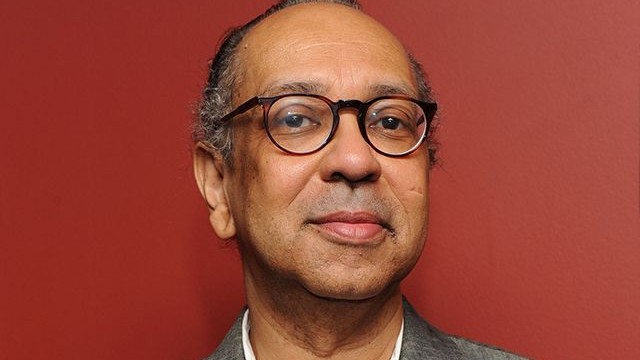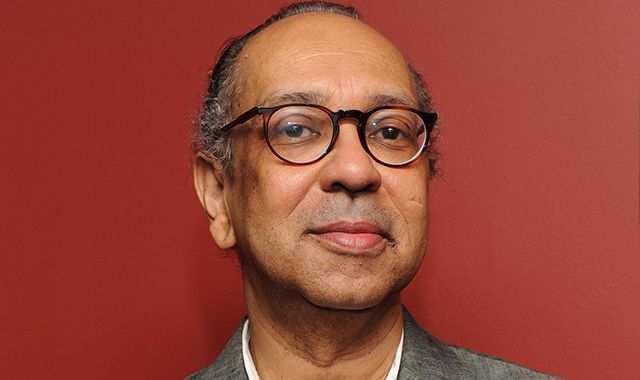George C. Wolfe is a very talented man. With deep roots working on Broadway as a playwright and director, Wolfe lends his directorial skills to the silver screen in the film You’re Not You, an emotional and uplifting story about the delicate bond of friendship. Starring Hilary Swank and Emmy Rossum, Wolfe tells me in our exclusive interview that he couldn’t have been happier with his cast. Their talent is “dazzling”, but it was their shared willingness to create and open reception to suggestions that made them the “perfect actors to work with.” What struck me hardest during our talk was Wolfe’s theory about the power of music in film, and life in general. His answer is extremely interesting, and gave me a new perspective on the way we interpret music. We begin:
WHAT DREW YOU TO THIS FILM, YOU’RE NOT YOU?
One- that it was about two women, and two- that they found a depth and a meaning between each other that they couldn’t achieve in other relationships. I loved that, and I just wanted to see what that was like. That’s what intrigued me.
YOU’RE NOT YOU WAS BASED OFF OF A BOOK, WAS THERE ANYTHING THAT SCARED YOU ABOUT DIRECTING AN ADAPTATION?
No, I mean I’m involved in a project right now that’s about a book- a very famous book that everybody loves, and I went through a period of intimidation, and then thought, ‘Get the hell over it.’ When you read a book, you dictate your journey with it. With a film, it’s telling you how you will go on the journey. So you have to be liberated and say ‘Thank you for this great source material and now I’m off on my journey.’
VERY TRUE. YOUR PREVIOUS FILM, NIGHTS IN RODANTHE, WAS BASED OFF OF A NICHOLAS SPARKS BOOK. DO YOU FIND COMFORT IN THESE ADAPTATIONS?
No, not really.
[Laugh]
I don’t know, I do select material but certain things come along at interesting times in one’s life. I don’t have any rules necessarily. I feel like if I can understand something inside of the story, then I feel as though I can help illuminate it. Like I mentioned, I was just fascinated by this incredibly intimate and powerful relationship between these two women. There are other projects that I’m working on that will trigger something in my brain that I will want to explore, and that’s how I choose projects- [based off] what intrigues me as a director and an artist.
YOU’RE NOT YOU IS A GREAT STORY, BUT WHAT REALLY MAKES THIS FILM SPECIAL IS THE CAST.
Totally.
Check out our review of You’re Not You here
PERSONALLY, I THINK OF HILARY SWANK AS THIS STRONG, POWERFUL WOMAN. HER PAST FILMS HAVE DEPICTED HER AS SUCH. IN THIS FILM, SHE IS SO VULNERABLE AND WE SEE A NEW SIDE TO HER. DID YOU HELP HER WITH THIS CHARACTER DEVELOPMENT?
Hilary is incredibly smart, very gifted with great emotional reserve. She did a lot of her own journey but we evolved together through this intimate and lovely way. What directors do, and what I did, is bring perspective. What was interesting, as much work as she did in the physical transformation, I helped to craft where [Swank and Emmy Rossum] were in their evolution as friends. So yes, I worked very intimately with her, but I also don’t want to take anything away from the work that she did. I was just making sure that the story that needs to be told, at any given moment, was being told.
DID YOU KNOW FROM THE MOMENT EMMY ROSSUM AUDITIONED THAT SHE WAS GOING TO BE CAST?
It was one of those things where, we saw a lot of women! It was a very attractive role for very obvious reasons. During the audition, in retrospect, a kind of chemistry began to evolve between me and her, a director-actor chemistry, and one of the things that’s really fulfilling is to watch that chemistry grow and grow. I adore her as an actor and I love working with her. Like Hilary, she’s dazzlingly skilled.
Between takes I would go up and give Hilary and Emmy notes and then instantaneously I would see [the change]. I would drop an idea and they would let that organically emerge from the scene as if it were their choice, and that’s a lovely type of actor.
I feel like if I can understand something inside of the story, then I feel as though I can help illuminate it.
YOU ALSO HAVE QUITE A HISTORY IN THEATER…
Yes, I’ve done 14 Broadway shows and ran the Public Theater for 12 years. So yeah, I’ve done a few plays in my day.
DO YOU FIND THAT THERE IS A DIFFERENCE DIRECTING FOR THE STAGE VS DIRECTING FOR THE SCREEN?
I think it can change- less so from medium to medium, but more so from project to project. I directed the first Broadway production of Angels in America and it was this [unique] robustness. It was seven hours of theater, and was [heavy subject matter], so it required certain muscles of myself. Then I did a two-character play that was much smaller, not in terms of depth. So I have to figure out what skill set I have, as a director, is appropriate for these stories.
THE MUSIC IN THE FILM IS VERY ON-POINT, EVERY CUE HAD A PURPOSE. IS MUSIC IMPORTANT TO YOU?
Very important. Of those 14 Broadway shows, I would say about half of them were musicals. Music is a language. When you hear music, you instantly trust it and then a part of you surrenders. If somebody starts talking to you, we’re trained as human beings to question it, but somehow when we hear music we instantly believe it. For me, when you’re working as a script-teller, you want to use music a lot because it’s another way to seduce an audience into going an emotional direction.
AMAZING, VERY TRUE! SO WHAT DO YOU HAVE COMING UP NEXT?
Oh boy, well I’m working on a couple of theater projects, one of which is a stage version of Black Orpheus, and I have a couple of film projects that… we’ll see, hopefully! One of the projects that I’m very proud of is that I helped to create this museum called the National Center For Civil and Human Rights in Atlanta, GA. And I’m writing a couple new plays as well. So I’m busy right now, which is good.
Morgan Rojas
Certified fresh. For disclosure purposes, Morgan currently runs PR at PRETTYBIRD and Ventureland.


